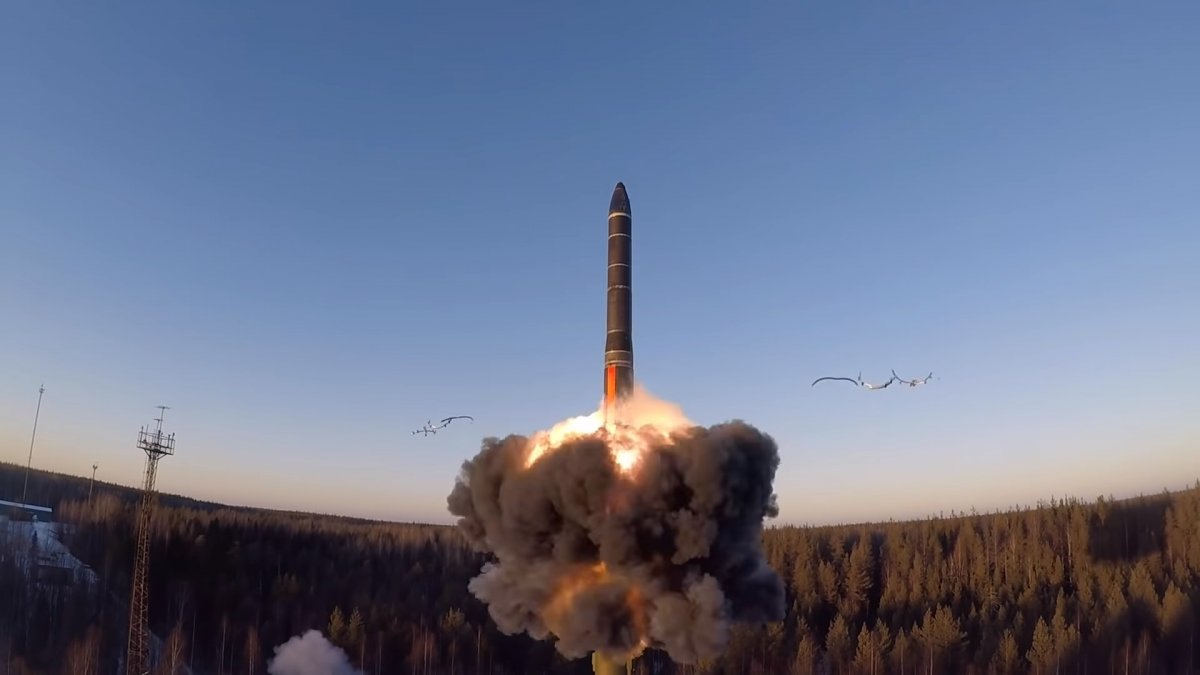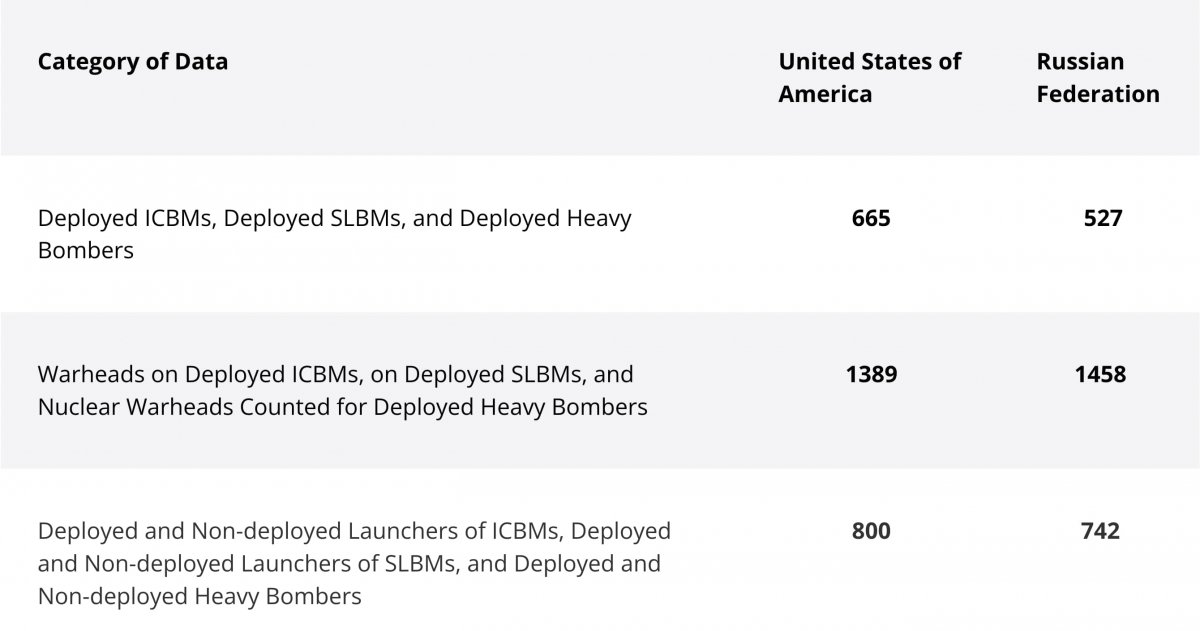Russia and the United States have released their latest nuclear weapons count at a time when ties between Moscow and the U.S.-led NATO military alliance were in freefall.
The Russian Foreign Ministry published on Monday its latest report on "the total number of strategic offensive arms," a tally required every six months by both Moscow and Washington as per their bilateral New Strategic Arms Reduction Treaty (New START) that entered into force in 2011.
The deal provides for limits and mutual verifications measures on the world's two largest nuclear weapons stockpiles and it was nearly set to collapse as former President Donald Trump left office on January 20 without renewing it ahead of the set decade-later expiration date of February 5. Incoming President Joe Biden agreed with his Russian counterpart Vladimir Putin to extend the pact, however, two days before the deadline.
In the second such release since then, Russia counted 527 deployed intercontinental ballistic missiles (ICBMs), deployed submarine-launched ballistic missiles (SLBMs) and heavy bombers, 1,458 warheads on deployed ICBMs, on deployed SLBMs and nuclear warheads counted for deployed heavy bombers as well as 742 deployed and non-deployed launchers of ICBMs, deployed and non-deployed launchers of SLBMs and deployed and non-deployed heavy bombers.
The report also placed U.S. figures at 665 deployed ICBMs, deployed SLBMs and heavy bombers; 1,389 warheads on deployed ICBMs, on deployed SLBMs and nuclear warheads counted for deployed heavy bombers as well as 800 deployed and non-deployed ICBMs launchers, deployed and non-deployed SLBMs and deployed and non-deployed heavy bombers.
The State Department released identical figures last month as part of the New START arrangement.
The deal limits both powers to 700 deployed ICBMs, deployed SLBMs and heavy bombers; 1,550 warheads on deployed ICBMs, on deployed SLBMs and nuclear warheads counted for deployed heavy bombers and 800 deployed and non-deployed launchers of ICBMs, deployed and non-deployed launchers of SLBMs and deployed and non-deployed heavy bombers.
Though both Washington and Moscow continue to agree on another's adherence to the last remaining nuclear treaty between them, tensions have nonetheless emerged as the relationship between Russia and the NATO coalition continued to erode.
In fact, asked about the "catastrophic" state of relations between the rival sides that defined the Cold War during a press conference in Norway on Monday, Russian Foreign Minister Sergey Lavrov said ties had been lost altogether.
"I would not say that the situation is catastrophic. To be catastrophic, you have to have at least some kind of relationship," Lavrov said. "We have no relationship with NATO."

Russia announced it would break off relations with NATO last week after the 30-member defense pact called for the expulsion of eight Russian diplomats by November 1, accusing them of espionage. The spat was the latest in a long line of incidents to plague Moscow's ties with the coalition.
Both sides have long accused one another of destabilizing moves. Russia's relationship with NATO began after the collapse of the Soviet Union and the dismantling of the Warsaw Pact, a Communist alliance established shortly after NATO in the earliest years of the Cold War.
After a chaotic turn in the 1990s, Russian President Vladimir Putin came to power at the turn of the 21st century and has led as president or prime minister ever since, seeking to restore the country's place in the world. Success U.S. administrations have attempted to "reset" relations with Moscow over the past two decades but relations have ebbed and flowed, taking a sharp downturn in 2014 after Russia's intervention and ultimate annexation of Crimea amid political unrest in Ukraine and amid accusations that Moscow backed separatists operating along the border of the countries.
The U.S. and Western countries have since also accused Russia of election interference, cyber attacks and assassination attempts against dissidents. Moscow has charged its rivals with undue intervention in the internal affairs of other states, the overuse of economic sanctions and an ongoing attempt to surround Russia through advanced missile defenses and so-called "color revolutions" to bring former Soviet republics into the NATO fold.
In addition to saving New START, Biden has set out to achieve what his administration refers to as "a stable and predictable relationship" with Russia, especially in the field of nuclear weapons. Russian officials say they seek to achieve a more positive dynamic with the U.S.
But the two have yet to reach any new comprehensive agreements, and worsening frictions with NATO members threaten to exacerbate existing rifts.
After NATO defense ministers discussed a "Concept for Deterrence and Defence in the Euro-Atlantic Area" that includes devising a multi-front strategy to block any hypothetical attack from Russia during a meeting Thursday, German Defense Minister Annegret Kramp-Karrenbauer told national broadcaster Deutschlandfunk that, as part of NATO's nuclear deterrence doctrine, "we are prepared to use such means so that it has a deterrent effect beforehand and no one gets the idea to attack NATO partners."
Russian Defense Minister Sergei Shoigu reacted to the statement on Saturday.
"Amid the calls for military deterrence of Russia, NATO is consistently pulling its forces to our borders," Shoigu said, according to the state-run Tass Russian News Agency.
"The German defense minister must know well how such moves in the past ended for Germany and Europe," he added, referring to the Eastern Front of World War II. "There can be only shared security in Europe, without infringements on Russia's interests. But it is NATO that is unprepared for an equitable dialogue on this issue."

Uncommon Knowledge
Newsweek is committed to challenging conventional wisdom and finding connections in the search for common ground.
Newsweek is committed to challenging conventional wisdom and finding connections in the search for common ground.
About the writer
Based in his hometown of Staten Island, New York City, Tom O'Connor is an award-winning Senior Writer of Foreign Policy ... Read more
To read how Newsweek uses AI as a newsroom tool, Click here.








